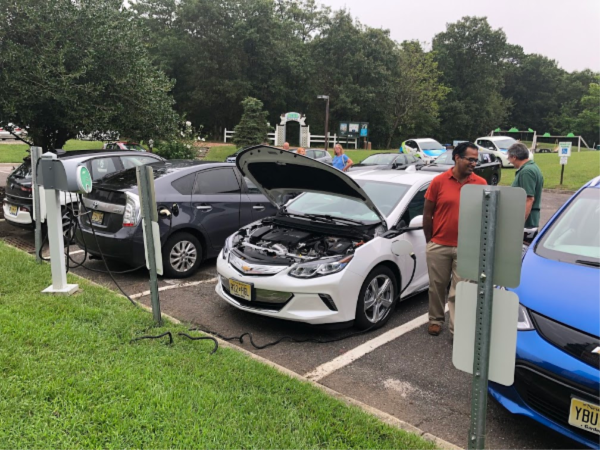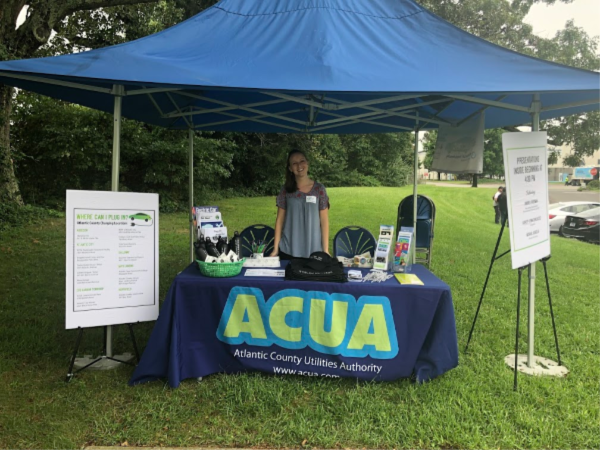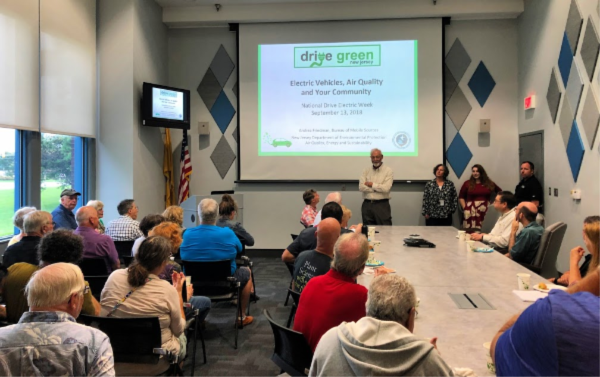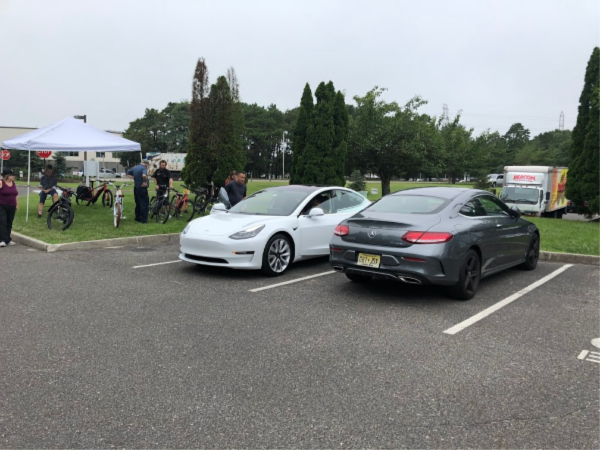Sep 17, 2018
By Ryan Mahoney, ACUA Communications Assistant

ACUA recently hosted a Drive Electric Celebration as part of National Drive Electric Week 2018 -- a nationwide event held in September to spread awareness of today’s widespread availability of plug-in vehicles and highlight the benefits of all-electric and plug-in hybrid-electric cars. The event, held at ACUA’s Environmental Park in Egg Harbor Township, brought together electric vehicle enthusiasts across South Jersey and newcomers of the community to discuss the advantages of driving electric.

A wide variety of electric cars were on display from local dealerships. ACUA had their own fleet of electric vehicles on display, which includes a Nissan Leaf and five plug-in hybrids.
Members from the New Jersey Department of Environmental Protection (NJDEP), ChargEVC, and EZ-EV were in attendance to give presentations. Andrea Friedman from the NJDEP gave an informative speech explaining why electric vehicles are a better alternative to gasoline-powered cars. Ashley-Lynn Chrzaszcz of ChargEVC touched on topics including the studies conducted and legislation being created to improve electric vehicle awareness.

For those who missed the celebration, we have compiled a list of the top seven takeaways to help you better understand electric vehicles and the status of the technology in New Jersey:
1. The electric vehicle network is growing in New Jersey.
The number of electric vehicle registrations in the state of New Jersey has grown significantly in the past decade. The number of registrants jumped from 338 in 2011 to 17,873 in 2017. More organizations like ChargEVC and EZ-EV are popping up to make owning an electric vehicle more feasible.
2. Electric vehicles are better for the environment.
Electric vehicles improve air quality and help address climate change. In comparison to cars with gasoline engines, they produce less ozone-causing chemicals, harmful particulates and greenhouse gases. Lessening the number of fuel engine vehicles will improve air quality.
3. Transportation is a leading cause of air pollution.
On-road vehicles are the highest contributor to ozone pollution. Transportation is the number one greenhouse gas source that causes climate pollution.
4. The difference between battery electric vehicles and plug-in hybrid electric vehicles.
Some people are unaware of the difference between battery electric vehicles and plug-in hybrid electric vehicles. Battery electric vehicles are 100% powered by an electric motor while the other is powered by an electric motor and a gasoline engine. Both use a battery to store the electricity. Once the electric motor of a plug-in hybrid electric vehicle runs out of energy in its battery, the gasoline engine starts to be used. This means that battery electric vehicles have no tailpipe emissions while plug-in hybrids have a reduced tailpipe emission.

5. There are many different options for electric vehicles.
If you are looking to purchase an electric vehicle, there are plenty of models to choose from. Some examples of battery electric vehicles are the Nissan Leaf, Tesla Model 3, Chevy Bolt and Ford Focus Electric. Plug-in hybrid electric vehicles include the Toyota Prius Prime, Chevy Volt, Ford Fusion Energi and Honda Clarity. Both Boardwalk Honda and Chapman Ford attended the Drive Electric Celebration displaying their vehicles.
6. Programs and policies are being created to promote electric vehicle use.
Organizations like ChargEVC and the NJDEP are developing programs to encourage electric vehicle adoption in New Jersey. The purpose is to ensure managed development of electric vehicle infrastructure. This includes filing petitions and creating legislation for the installation of charging stations along more major roadways and in neighborhoods.
7. New Jersey has a grant program for EV charging stations.
To make electric vehicle ownership more accessible in the state, there are grants of up to $6,000 per charging station for the purchase and installation of EV chargers at workplaces, public places and multi-family homes. All New Jersey governments, businesses, non-profits, schools and multi-unit apartment complexes are eligible. The NJ DEP creates approvals for this grant after applications are submitted. You can click here to apply.
Presentations from the Event: